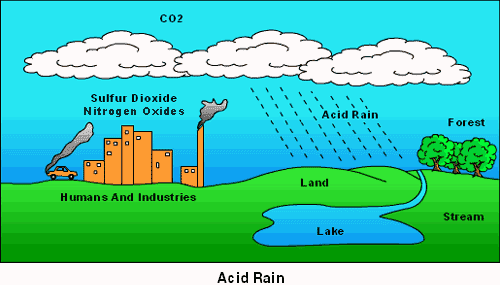Environment on our planet is getting polluted by the day and considering the ongoing trends the situation is not likely to improve in the foreseeable future. Greenery is getting depleted from the face of the earth and water, the most precious natural resource is becoming scarce and toxic.
Here we’ll talk about environmental problems caused due to water crisis:
Acid Rain
You should know that many gases like nitrogen oxide, carbon dioxide and sulfur oxide on reacting with water form various acids. When this chemical reaction takes place in atmosphere, acid rain is formed. It is so called as it has a low or acidic pH value. Though a small percentage of the said gases are naturally formed in environment due lighting and volcanic activities, most of these are released into the atmosphere through industrial and vehicular exhausts, thus raising their level in the atmosphere to an extent that nature is not able to cope with.

Consequence:
As a result of acid rains natural rocks, stones and metals get corroded and paint from painted surfaces gets peeled off. In other words, bridges, building and monuments get exposed to risks. If acid rain continues to progress at its present rate, it could damage our skin if we are caught in acid rain.
Wastewater
We can’t help producing wastewater. However, with the ongoing all round development, the constituents of waste water are changing rapidly. All those materials which can’t easily be disposed off otherwise are included in wastewater, which ultimately affect the overall quality of water and thus the quality of food grown using that water.

Consequence:
Unless we have an effective system for managing wastewater, all life forms will be affected.
Urban Run-off
Urban run off is rainwater that travels over land before merging with water bodies. With increasing urbanization this natural process is adversely affecting our water bodies as today’s run off contain many harmful chemicals along with microscopic solid or liquid matter. If we have enough of vegetation in the form trees, just about ten percent of the entire quantity of rainwater enters water bodies as run off. At present, this figure stands at about five times of that figure.
Consequence:
Urban run offs carrying garbage, gasoline, oils, heavy metal like copper, lead, nickel and zinc along with chemically formulated pesticides and fertilizers finally enters our food chain through already polluted water resources , thus causing various health issues.
Eutrophication
Eutrophication can be defined as an increase in the rate of growth of phytoplankton in any water body. Nearly all sources of natural water are prone to getting polluted. This enhances the level of substrates like nitrates, phosphates and sewage waste in sources of water and advances growth of plants at such a rate that level of oxygen plus other nutrients in water bodies is totally exhausted.

Consequence:
One consequence of eutrophication is algal bloom. As the level of oxygen in water bodies gets reduced, many species of fish and marine life as a whole could undergo a sea change. Alternatively, it could enhance the population of unwanted marine species, thus spoiling the natural balance.
Marine Pollution and Acidification
The reasons for marine pollution are ineffective and insufficient treatment of waste water, eutrophication and urban run offs. Additional contributors include solid materials, particularly plastics that create a lot of troubles. Marine acidification implies the change in the pH value of oceanic water because of carbon dioxide released by marine plants.
Consequence:
We just can’t afford oceans to get polluted. We can still manage to control pollution of well, lakes, river and ponds, but when the oceans get polluted irrevocably, it will be devastating for all living beings.
